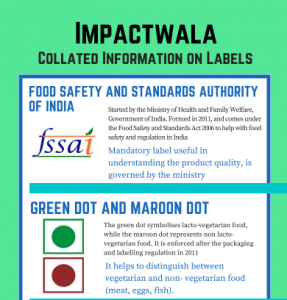| Label | Description | What it means |
 |
Food Safety and Standards Authority of India Started by the Ministry of Health and Family Welfare, Government of India. Formed in 2011, and comes under the Food Safety and Standards Act 2006 to help with food safety and regulation in India |
Mandatory label useful in understanding the product quality, is governed by the ministry |
  |
Green dot and Maroon dot The green dot symbolises lacto-vegetarian food, while the maroon dot represents non lacto-vegetarian food. And is enforced after the packaging and labelling regulation in 2011. |
It helps to distinguish between vegetarian and non- vegetarian food (meat, eggs, fish). |
 |
India organic/ NPOP standards (National Program for Organic Production) It is a certification for organically farmed food products manufactured in India. It should conform to National Standards for Organic Products. The raw material in these products are grown through organic farming without the use of chemical fertilizers, pesticides or induced hormones. |
Certification for organic products, regulated by the government. |
 |
Ministry of AYUSH The full form is the Ministry of Ayurveda, Yoga and Naturopathy, Unani, Siddha and Homeopathy. AYUSH is the body setup for development, research and education in those fields. |
Label set up for brands that use alternatives in consumer products. |
 |
Non GMO project verified It is a non profit organization founded in 2007, that promotes the use of non GMO crops and produce. This is done by assisting farmers, processors and manufacturers and providing them with the right tools. |
It indicates if the product contains genetically modified food and has specific guidelines. |
 |
USDA Organic refers to United States Department of Agriculture and have a set up a framework to regulate organic food and laws behind its usage in the United States. Each product under the seal should have at least 95% organics ingredients. |
Widely known label for organic produce around the world. |
 |
FSC – Forest Stewardship Council It is a non profit organization to promote responsible management to the world’s forests. They have a set standard for forests and certify and label them as eco friendly. |
Does not say anything about the food quality but gives perspective on ethical sourcing. |
 |
Halal certified Halal generally refers to what is allowed under Islamic law, especially for food and drinks. This certification goes through a four step verification process, with periodic checks to make sure the food is halal. |
Describes food items which are permissible under Islamic law. |
 |
Kosher food The kinds of food that have this symbol meets the Jewish dietary laws. It is called a hechsher that contains no substance that is not allowed under Hebrew law. |
Describes food items which are permissible under Jewish law. |
 |
ESA (European Snacks Association) Member This association is to promote European savoury snacks. They represent around 80% of the branded European snacks market. |
Only informs of membership to the association and not much for food quality. |
 |
Greendot health foods logo It is the name of the company that manufactures snacks like chips, dips, nuts and seeds. |
It is a company logo and should not be confused with ‘ecolabel’ |
 |
Clean India This logo alludes to the ‘Swachh Bharat Abhiyan’. |
Indicates the contribution towards clean india campaign but nothing on product information. |
 |
Tidyman This is used to encourage consumers to throw their packaging into bins, and is found on most packaging. It is a product of the post war consumerism boom that encourage people not to litter, and instead throw packaging in the trash. |
Only indicates the trash should be thrown in a dustbin. |
 |
Protects What’s Good Tetra Pak Organization that promotes food safety, people, society, environment and future and is about minimising impact on the environment. |
Indicates Tetra Pak, harmful to the environment. |
 |
Recycling This logo is a universally accepted symbol for recycling products. Recyclable products generally fall under these categories – glass, plastic, paper, cardboard, aluminium, tin cans. |
This indicates the packaging is down-cyclable not recyclable |
 |
18M PAO – Period After Opening It is a symbol used particularly in cosmetics in place of the best used stamp. This particular stamp tells us that the product is viable for 18 months after opening. |
Glorified best before date. |
The Myths behind Labels !
With an exponential increase in consumerism, there is also rising awareness on the ethical, ecological and health impacts of the products we all are purchasing. There are a plethora of labels that one finds on product packaging that guarantee a million things. However, the question is how much do we know about these labels, the credibility they hold and ultimately whether these products are safe or not? In conversation with our friend Baptiste who’s visiting earth&us from France, we explore these challenges.
Baptiste has been involved in promoting ethical consumption through Eco-Sapiens for the past 10 years. He explained to us that there are hundreds of labels on product packaging and this Jungle of labels includes organic labels, animal testing free, ecological significance et cetera.

To understand better, we decided to visit a supermarket in Pondicherry in a quest for our answers.
While exploring the supermarket’s shelves, we discovered that quite a few labels held no significance but were prominently displayed on the products solely for marketing. Baptiste introduced us to a term greenwashing that refers to labels which claim the products to be something but are in-fact not. Some of these labels included companies who self-proclaim to be organic, labels indicating home-made items or labels with no online information for criteria.
The next question that made us curious was: do consumers really care about these labels?
The next question that made us curious was: do consumers really care about these labels?
According to Baptiste over 85 % of people in France prefer supermarkets where the products are sorted by category and most of the information is obtained from package descriptions. In India, however, there is a strong presence of local markets and street vendors who sell the same products without really realising the sustainability aspects.

The sole objective remains profit maximisation and thus, the disparity between the product information and consumers widens. Nevertheless, there is a conspicuous shift of consumers towards information awareness and product segregation in the major cities of India. Moreover, with the significant progress of e-commerce, the information on the labels will hold even more value.
Eco-sapiens has come up with an interesting method where they classify the labels either “good” or “mobsters”. This way the consumers can decide which labels to believe and which ones to ignore. We endeavour to develop a similar strategy for the Indian market. It is our aim to enable consumers to understand their labels better through an initiative called ‘Impactwala’ that empowers the consumers to make impact by providing easily decipherable data at the point of decision making.
Here is the collated information on the labels used by food items with some expert advice gathered during our visit to the supermarket:




